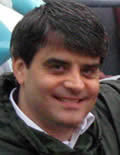
It probably won’t become the sports equivalent of “hiking the Appalachian Trail,” but as excuses go, the North Korean coach’s explanation for his team’s World Cup loss to the United States has a certain electromagnetic appeal.
The team was struck by lightning.
This jolt — sorry — did not occur during the mid-June game in Dresden, but three weeks earlier during a training match in Pyongyang. (You’d think someone could just search the Pyongyang Times-Picayune archives to verify Kim Kwang-min’s claim, but its website must have a paywall.) Kim said a handful of players were hospitalized and their doctors ruled them unfit to play, but they did anyway.
If so, that’s some serious bad luck. If not, the “we-were-struck-by-lightning” defense deserves a place among the great alibis (from the Latin for “trial balloons”) that coaches and athletes have floated over the years.
Lou Holtz, who has been known to gild the occasional lily, had one of my favorites. After Ron Powlus threw four interceptions in one game, Holtz blamed it on the way Michigan State’s home green jerseys blended into Spartan Stadium’s artificial turf. Which made you wonder where, exactly, Holtz had instructed Powlus to throw the ball on all those attempts.
From the “Signed, Epstein’s Mother” category of excused absences comes Sly Williams, pretending to be his brother in a phone call to the New York Knicks explaining why he missed a practice: “There’s been a slight death in the family.” Claudell Washington also deserves an honorable mention. After the Texas Rangers traded him to the Chicago White Sox, Washington didn’t show up for four days. Why? “I overslept.”
Boston Red Sox relief pitcher Jonathon Papelbon said his dog ate the ball he used for the final out of the 2007 World Series. Although that seems to be the truth — despite a slight contradiction in Papelbon’s accounts of what he did with the remains (of the ball) — any exhaustive study of excuses must include one of the my-dog-ate-it variety.
Athletes who injure themselves off the field — particularly those doing something dangerous that their contracts prohibit — have to think fast for a plausible reinterpretation of events. Jeff Kent of the San Francisco Giants claimed he broke his wrist while washing his truck. In fact, witnesses said they saw him crash while popping wheelies on a motorcycle, which would have violated his contract.
This era of pervasive performance-enhancing substances has spawned new levels of ingenuity to explain positive drug tests. Distance runner Dieter Baumann said someone spiked his toothpaste. Gold-medal sprinter Justin Gatlin said his masseuse use an illegal cream to sabotage him. Tennis player Petr Korda blamed steroid-fed veal — although an analysis indicated a person would have to eat 40 calves a day to achieve the level he had in his system. And sprinter LeShawn Merrit illustrated just how much embarrassment an athlete will endure to avoid the taint of steroids, insisting he tested positive because of an over-the-counter penis-enlargement drug.
Excellent examples, all, of the lengths — sorry — people will go to when confronted with their own guilt. But none compare to cyclist Tyler Hamilton, who has since admitted to doping. He claimed his vanishing twin did it. In other words, blood cells he absorbed from a sibling who died in utero explained why his test suggested an illegal transfusion. That phenomenon exists, but he would have sounded more credible if he blamed it on a lightning strike.
Jason Kelly, a former sports columnist for the South Bend Tribune, is an associate editor of the University of Chicago Magazine. His most recent book is Shelby’s Folly: Jack Dempsey, Doc Kearns, and the Shakedown of a Montana Boomtown. Email him at jasonkelly545@gmail.com.